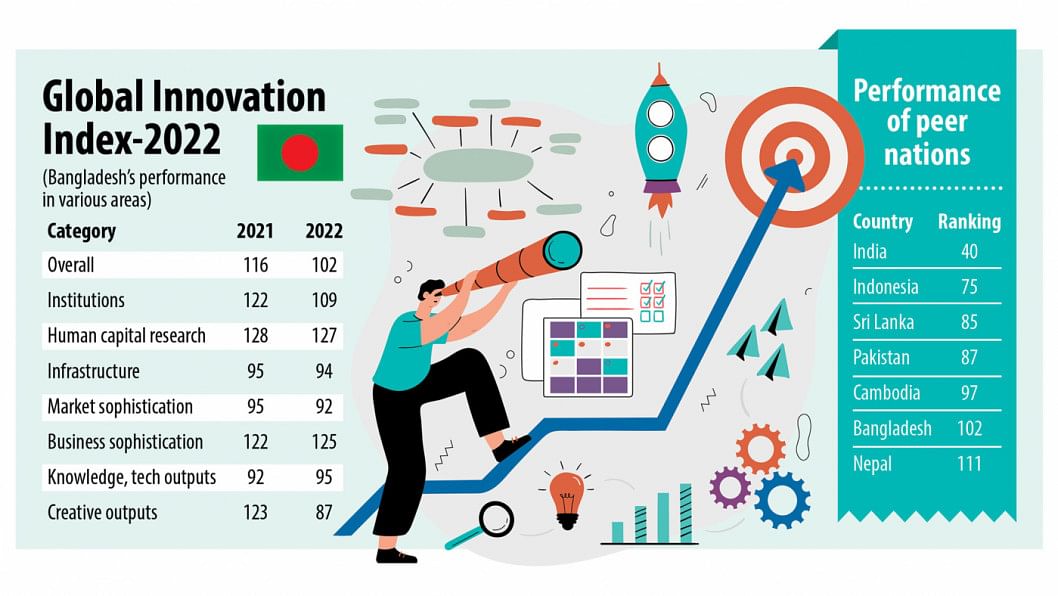Bangladesh moves up 14 notches

Bangladesh has advanced 14 spots in the Global Innovation Index (GII) 2022 in a major stride but it still lags behind some of its innovative peers.
The ranking by the United Nations' World Intellectual Property Organization (WIPO) placed the country at 102nd last year, up from 116th in 2021, among 132 economies.
Although Bangladesh's overall score was 19.7 compared to top-ranked Switzerland's 64.6, its performance was in line with the level of the country's development, according to the report.
The lower ranking, however, highlights Bangladesh's weak education system, lack of human capital and research, and shortfall in business sophistication.
The index uses various indicators to rank innovation. They include measures on the political environment, education, infrastructure and knowledge creation.
Bangladesh performs relatively well in the creative output category, advancing to 87th place from 123rd a year earlier, driven by its solid progress in industrial design, global brand value, and mobile app creation.
In the institution category, Bangladesh moved up 13 notches to 109th and slipped one spot to 112th position in the political environment segment.
It advanced one spot in the human capital and research segment to 127th and its ranking was unchanged at 129th in the education segment.
In the business sophistication category, the country fell three spots to 125th as Bangladesh performed poorly in the FDI net inflow, intellectual property payments, and university and industry research and development collaboration.
Apart from Bangladesh, Myanmar (116th) and Ethiopia (117th) have made the most progress in the rankings, rising between nine and 14 positions overall, said the report.
Relative to 2021, 27 economies switched performance groups in 2022: four economies raised their performance status from below expectation to matching expectation, namely Sri Lanka (85th), Bangladesh, Ethiopia, and Yemen (128th).
Sri Lanka, Pakistan (87th) and Bangladesh jumped up the ranking notably this year, the report said.
Only Pakistan has steadily gained its position over time. It was ranked 133rd in 2012. Sri Lanka has gone through ups and downs in the ranking and this year reclaimed the 85th position it first held in 2015.
According to the 15th edition of the GII, Bangladesh's improvement came on the back of solid performance in online creativity and corporate intangible asset intensity.
AKM Fahim Mashroor, chief executive officer of Bdjobs.com, an online job portal, says he was not surprised by the poor ranking of Bangladesh in the GII.
"We have seen a gradual deterioration in education standards in the last few decades. Local universities are also ranked very lowly compared to their peers even in the neighbouring countries. Education quality is the major factor for innovation ranking among the nations."
"Unless we improve in such innovation rankings, we will not be able to attract venture capital investment in the startups and technology sectors."
Khondaker Golam Moazzem, research director at the Centre for Policy Dialogue, described the 14-spot upward movement as a positive development.
"However, we are still at the lower levels in terms of innovation. Our position is not promising."
He said Bangladesh is at the bottom of the South Asian countries except for Nepal.
"The culture of innovation has not developed in our country," he said, adding that none of the critical components of the culture for innovation -- logistics, infrastructure, human capital and proper innovation ecosystem -- has been built.
Although there is some innovation in ICT, the developments are sporadic, according to the economist.
"We need a whole innovative society approach. Our thinking and preparation are yet to be found in this regard."
Moazzem pointed out that the government has policies towards a digital and smart economy and has spent a lot in the area.
"So, we need to assess why those efforts haven't made any significant contributions to innovation," he added.
Switzerland is the most innovative economy in the world in 2022 - for the 12th year in a row - followed by the United States, Sweden, the United Kingdom and the Netherlands, according to the 2022 edition of the Index.
China moved up to 11th place, overtaking France and for now, it firmly remains the only middle-income economy within the GII top 30.
Turkey and India have entered the top 40 for the first time.
Iran made a big leap, reaching the 53rd position and Indonesia took a big jump into the top 80.

 For all latest news, follow The Daily Star's Google News channel.
For all latest news, follow The Daily Star's Google News channel. 







Comments